- Home
- William Shatner
Leonard Page 2
Leonard Read online
Page 2
Growing up, I worked as a suit packer in my father’s factory; I take great pride in my ability to fold. I’ve often said if the acting thing hadn’t worked out, I would have had a fine career in professional folding.
As a kid, Leonard took any job he could find. He sold newspapers, he worked in his cousin’s card shop, he shined shoes, he set up chairs for the Boston Pops. Whatever somebody was paying to be done, he would do it. He even sold vacuums for the Ace Vacuum Company. The money made a big difference in the family finances. Leonard’s biggest memory about the day the Japanese attacked Pearl Harbor, for example, was the fact that he sold all his copies of The Boston Record and couldn’t get any more of them.
Neither one of us were especially good students. With so much out in the real world to learn, school just didn’t hold our attention. But there was one skill at which both of us excelled: we could talk. My mother was an elocution teacher and never hesitated to correct my speech; Leonard once won a declamation contest at the neighborhood settlement house, the Elizabeth Peabody House, by memorizing and reciting the entire text of Longfellow’s The Song of Hiawatha. If I close my eyes, I can hear his deep and somber voice, playing with Longfellow’s words as he says with utter conviction:
By the shore of Gitche Gumee,
By the shining Big-Sea-Water,
At the doorway of his wigwam
In the pleasant Summer morning …
And when I do that, it’s almost impossible not to smile.
It is, however, a little more difficult but considerably more fun to imagine the taciturn Mr. Spock reading that poem with both curiosity and a complete lack of emotion.
TWO
It was in our neighborhoods that both of us took our first steps into the future. Acting is such an odd profession. It’s a profession in which you spend your life trying to convince people you are someone else. There isn’t any single reason young people become actors. Obviously, it can be a lot of fun and play, but I think for most people who take it seriously, it fulfills some type of need. John de Lancie, who created the character Q for several Star Trek generations and worked closely with Leonard doing staged readings of great plays, explained he became an actor because “it was the first time in my life that anyone had responded well to anything that I’d done. I grabbed onto it like a life preserver. It gave me an identity.”
My mother enrolled me in the Dorothy Davis School for Actors when I was about eight years old. We met in somebody’s basement. My mother was a frustrated actress. She would act out monologues at home for an audience of me. But I suspect she thought it would be a good activity for me; I didn’t have any close friends. I suspect it hurt her to see me walking to school each morning all by myself.
Like me, Leonard found acting when he was eight years old. The settlement house was the center of most immigrant neighborhoods. As Leonard described it when he gave the 2012 commencement address at Boston University, “It was a community settlement house which was created to help immigrants find their way into the culture. They offered classes in language, cooking, shopping, kitchen sanitation, dental care and how to apply for a job. There was a gym and a sports program. And there was a small gem of a theater.” It was the place to hang out and learn how to be American. Immigrant families had neither the time nor money to spend on culture.
In Leonard’s apartment, for example, there were no books. His family had a radio and an old record player and three or four Yiddish records. They would play the same record, a collection of songs sung by Yiddish theater star Seymour Rexite, over and over and over. The Elizabeth Peabody House had a 375-seat theater in which they presented programs for both adults and children. Leonard actually had a pleasant singing voice; he used to sing in his synagogue choir. In fact, his singing at his own bar mitzvah was so good that he was asked to perform the whole ceremony again a week later at another shul. He is still the only man I know whose voice was two bar mitzvahs good! Who else made a guest appearance at a bar mitvah?
Apparently, one afternoon when he was hanging out at the settlement house, they were casting a children’s show. They brought him into a music room where a woman was sitting at a piano and asked him to sing. While he never remembered what song he sang, it was enough to earn him a leading role in a production of Hansel and Gretel.
Acting came easily to him. It was playing. He could memorize lines, he could sing, and he enjoyed performing. In those days, there were numerous local radio shows for children, and both of us worked on some of those programs. While I was performing heroic acts on Saturday Morning Fairy Tales, Leonard was doing Bible stories. Obviously, there was something symbolic about that. Many years later as Captain Kirk, I would be busy rescuing civilizations in distress on distant planets while Leonard’s Mr. Spock would be examining the morality of man- and alienkind.
In the pursuit of most professions, there is some sort of loosely defined career path. There are educational requirements that have to be fulfilled or mechanical skills that have to be mastered or an apprentice program that has to be completed. There is no path leading to an acting career; no right way or wrong way, no tests to pass. Talent matters, of course, but it is not enough. I have known many wonderfully talented people who just never got the right opportunity. Often, it is simply a matter of being in the right place at the right time and having some often undefined quality or desirable look; in many situations, it’s as much marketability as acting ability. But every actor needs that first break. For Leonard, it was meeting Boris Sagal.
Sagal also had come from Ukraine. He was a Harvard law student with an interest in theater. The settlement house, which was only a ten-cent MTA ride across the Charles River from Harvard, let him stay in one of its guest rooms in exchange for directing plays. He was casting a production of the Clifford Odets play Awake and Sing! and put seventeen-year-old Leonard in a leading role. That was the first adult play Leonard had ever done, and it fit him perfectly. It was the story of three generations of a lower-middle-class immigrant Jewish family living together in an apartment in the Bronx. Leonard’s character, Ralph Berger, is an idealistic young man who rejects materialism but needs money to buy his own freedom. When I interviewed Leonard on my TV show Raw Nerve, he told me about the impact that play had on his life.
“I thought, this is really interesting. This is about people like me … It’s about our lives and the pressures and the loves and the hates and the angers and the frustrations, the fears.
“This kid I’m playing has the same concerns that I’ve got: what am I supposed to do with my life and who am I supposed to be … The show closes, and I go to the theater to pick up my wardrobe, the clothes that I was wearing in the play. They were my own clothes. The theater was four or five blocks away from my home in Boston. I pick them up, and I’m walking home through the streets of Boston … and I realized I was going in the wrong direction. I’m saying to myself, I’m more comfortable there than I am at home. I want to do what’s there in the theater. I don’t want to do what’s happening in that house. There’s nothing for me there. I’ve got to get out of there. That’s when I realized I’ve got to get away.”
That job also changed Boris Sagal’s life; he forgot about studying law and was accepted at Yale School of Drama and eventually became a successful TV and movie director—and would work with Leonard again.
Coincidently, I was just about the same age as Leonard when I got one of the first real parts of my career—appearing in a production of Clifford Odets’s Waiting for Lefty, a pro-union play being done at a Communist organization meeting hall in Montreal. Both Odets plays communicated a strong political philosophy, but I didn’t care at all about that, and I suspect Leonard didn’t either. At least not at that time. It was an opportunity to stand on a stage and act. That was all that mattered.
Many years later, Leonard’s son, Adam, was making the transition from being an attorney to becoming a director. His TV career had gotten off to a good start when, he remembered, “I got an offer to do an independe
nt production that I didn’t think was going to lead anywhere. It felt like a step back, and I was going to turn it down when my dad asked me, ‘Well, do you have another offer to do something else?’
“I didn’t, I told him.
“‘Well, then, take the job. You take the job because you need the job. You don’t want any downtime. And number two, I guarantee you, you will either learn something from that job or you’ll meet somebody on that job who’s going to help you. You take the job. Don’t turn down work if you don’t have work to replace it.’”
If there is an actor’s mantra that is it: take the job. We all lived by that, although for a long time most of us didn’t live very well by it.
In 1949, Leonard was cast in the comedy John Loves Mary being done at a neighborhood temple. The director, Alysso Ristad, was a student at Boston College. Ristad invited the head of the school’s theater program, a Jesuit priest, to see the play. Backstage, after the performance, the priest offered Leonard a half scholarship—valued at $37.50—to attend a summer acting program at Boston College. That seemed like a great deal, but Leonard had to raise the other half, which actually was a substantial amount of money for him at the time. Leonard always described the West End as a village, a place where people looked out for each other. The head of another settlement house agreed to sponsor him. That program gave him the professional foundation he needed. He remembered, “It was a very enchanting eight weeks of theater, acting classes, helping build sets, learning how to design a set, how to light a set.”
At the end of that summer, Leonard was offered a scholarship to attend the college, but he had already made up his mind: he was going to Hollywood to become an actor. It was a decision, he once said, that left his parents “grief stricken.” An actor? Who becomes an actor? It’s not a profession for a nice Jewish boy. Stay in Boston, they told him; go to college. Like most immigrant parents, they wanted him to have a real profession, preferably as a doctor or a lawyer. His older brother had gotten his college degree and become a chemical engineer, a real job, not like acting.
“My father’s response was amazing,” Leonard said. “He warned me, ‘You’ll be hanging around with gypsies and bums.’ I understood that his vision of actors were the people who came into Iziaslav, in the villages and towns as a company, and did a performance in the town square and passed the hat—then maybe steal a loaf of bread, make love to the mayor’s daughter, and leave in the morning. There was no future that he could see.
“And then he offered me one piece of advice, ‘Learn to play the accordion.’ Because if I could play the accordion, I could always make a living working bar mitzvahs and weddings. I was okay about that, because I understood what his thoughts were.”
It was Leonard’s grandfather who stood up to his parents, telling him to go and do and be, telling him to live his own life. Leonard always kept a little leather pouch with a zipper his grandfather had sewn from scraps, and it was one of his most valued possessions. “He was my guy,” Leonard said about his grandfather.
Just imagine the desperate passion that Leonard must have felt to leave his parents and everyone he knew behind to go to California and take up this strange profession that in fact he knew so little about. The world was very different then. Hollywood existed as much as a fantasy as a real place. It wasn’t easy to travel back and forth across the country; flying was much too expensive, and trains took several days. It was so expensive to call there that people in the east would wait until nighttime when the rates went down before telling the operator in solemn tones, “Long distance, please.”
Maybe the hardest part of it was leaving his mother. There was a Yiddish poem written by Itzik Manger that he loved. It’s told by a young boy, who sees a tree “left alone, exposed to the storm.” He decides that he will become a bird and rest on that tree and bring it comfort with his beautiful song. But his mother objects, crying, “Maybe you will freeze to death on the tree.” So she makes him put on winter clothes and boots, a scarf, and a cap, and as a result, “I raise my wings to fly, it is too heavy for me … Her love hasn’t let me become a bird.” Leonard always identified with that poem. “I got away,” he said, “but it was tough. It was very tough.”
In addition to the $600 Leonard had saved from selling vacuum cleaners, he sold his prized possession, an electric-blue Ford, to his friend Henry Parker, and bought a $100 coach train ticket to Los Angeles. His parents went with him to the train station, and his mother stood there crying as the train pulled out. “I was an adventurer taking off for another world,” he said. “To be an actor.”
There really are only two places in America for actors to find work: Hollywood and New York. Hollywood was the center of the film industry; New York was the place for theater. The television industry was just beginning in both places, but for an actor, it wasn’t considered either prestigious or important. A well-known actor’s joke tells the story of several actors from New York who get in a car to head for California, while at the same time several Hollywood actors set out for New York. As these two cars pass each other in Kansas City, all the actors lean out the windows and shout, “Go back!”
Neither Leonard nor I became actors because we thought that someday we would be stars earning considerable fortunes. Leonard always said his goal had been to earn $10,000 a year as an actor; my goal was to earn $100 a week. It wasn’t the possibility of stardom and money—there simply was nothing else we could do with our lives and feel fulfilled. It was who we were.
My experience was remarkably similar to Leonard’s. I was in my third year at McGill University in Montreal when I told my father that I was going to be an actor. He was devastated. He tried to talk me out of it: “Acting isn’t a respectable job for a man,” he said. I wouldn’t be able to earn a living at it. I’d be like one of those minstrels, never having a real home. Didn’t I want a real life, with a home and a family? To his credit, he let me fly. When he finally accepted the fact that I was completely serious, he told me that, no matter what happened, there would always be a place for me. He asked only that I didn’t become a hanger-on, someone who was dependent on other people or public assistance. That was his way of telling me to be a man.
While Leonard went west to California, I went south to New York. My career path was considerably different. I worked in summer stock in Canada and during the winter was a member of the Canadian National Repertory Theatre—a very, very minor member. But I was learning my craft every day. After three years, I was invited to join the Shakespeare Festival in Stratford, Ontario, which already was recognized as one of the finest rep companies in the world.
One day while I was driving to Toronto in a tremendous rainstorm and as I crossed a bridge, a mammoth eighteen wheeler coming from the other direction raced by me, spraying water from its front tire wells. The combination of a massive blast of water and the wind generated by the truck almost blew me into the Ottawa River. I realized something about myself at that moment: if my car went into the river, I would have left no tracks on this earth. Beyond my family, there was no one who truly cared about me. I had no close friends; I knew a lot of people, I’d worked and shared experiences with a lot of people, but there was no one who would miss me if I disappeared beneath the river. And conversely, there was no one other than my family that I cared enough about to miss if something happened to them. That understanding left me with a terribly empty feeling, but I didn’t have the slightest idea what I could do to change that.
At Stratford, I eventually became a leading man. In 1955, my third season, we did Marlowe’s Tamburlaine the Great. Anthony Quayle played the lead. I was the second lead. The play was so successful, we moved to the largest theater in New York, the Winter Garden. Our scheduled twelve-week run lasted only eight weeks, but by that point, I had been working regularly for several years and had proved that I could make a living as an actor. As long as I could survive on one meal a day.
It was much tougher for Leonard in Los Angeles. He enrolled at the once-respected Pasad
ena Playhouse but quickly was disillusioned. Students at the playhouse weren’t eligible to perform on the main stage until their third year. Coincidently, they were doing a production of the same comedy Leonard had done in Boston, John Loves Mary. But as far as he was concerned, they weren’t doing it as well. “I thought,” he said, “I have to study here three years in order to do this level of work, and I’m already doing better work.” After six months, he left, and within a couple of years, the school closed.
Go to law school and become a lawyer. Go to business school and become a businessman. Go to acting school and become a waiter, a cab driver, or—as in Leonard’s case—work the counter in an ice cream parlor. Leonard moved into an inexpensive rooming house off the Sunset Strip. Most of the people living there were just like him, young actors looking for a break, or at least an agent. It was a grind; he went to all the talent agencies and casting agencies handing out his eight-by-ten head shot, looking for an opportunity. It was the same path that has been followed by countless young men and women hoping for the big break. Most times it never happens. It was a good thing his grandfather didn’t get to check the soles of his shoes.
Leonard considered himself a character actor rather than a leading man. He always said his idols growing up were Paul Muni and Lon Chaney, actors who carefully crafted each one of their characters. Being a supporting actor rather than a lead was an interesting choice for Leonard. Once, thinking about that, he told an interviewer, “I’m a second child who was educated to the idea my older brother was to be given respect and not perturbed. I was not to upstage him. I was to give ground. So my acting career was designed to be a supporting player, a character actor.” That seemed to be a part of Leonard’s personality; while he certainly appreciated the benefits of his success, I never saw him act like a star. I actually remember thinking as I watched him at a Star Trek convention that on some level he seemed perplexed or even amused by the concept that fans adored him. Conversely, I was the only boy in our family; I had two sisters and a mother who adored me. I felt like a leading man in my childhood.

 Man O' War
Man O' War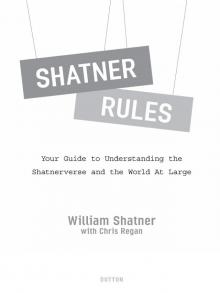 Shatner Rules
Shatner Rules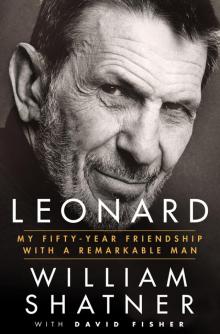 Leonard
Leonard Captain's Glory
Captain's Glory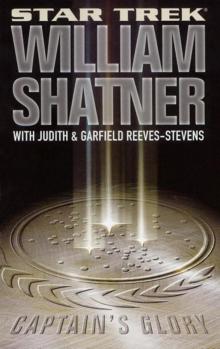 Captain's Glory зпвш-9
Captain's Glory зпвш-9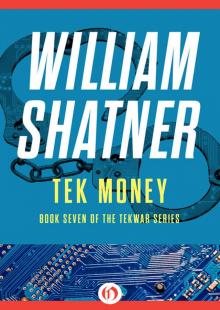 Tek Money
Tek Money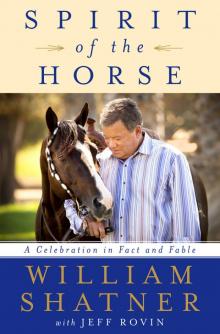 Spirit of the Horse
Spirit of the Horse Tek Vengeance
Tek Vengeance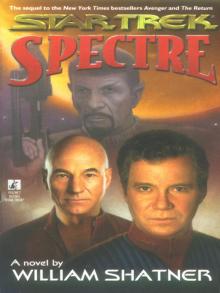 Spectre
Spectre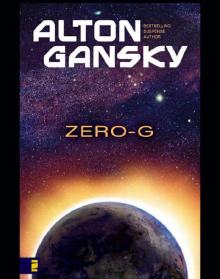 Zero-G
Zero-G Tek Kill
Tek Kill Collision Course
Collision Course TekLab
TekLab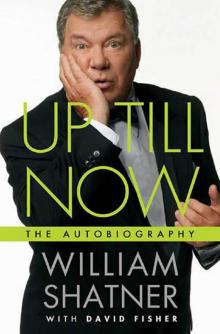 Up Till Now
Up Till Now Captain's Blood
Captain's Blood TekWar
TekWar Tek Secret
Tek Secret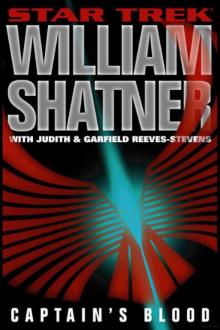 Captain's Blood зпвш-8
Captain's Blood зпвш-8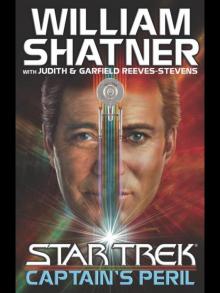 Captain's Peril
Captain's Peril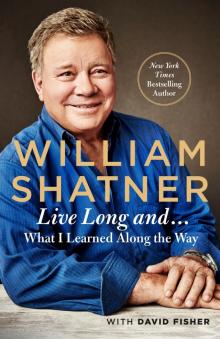 Live Long and . . .
Live Long and . . .